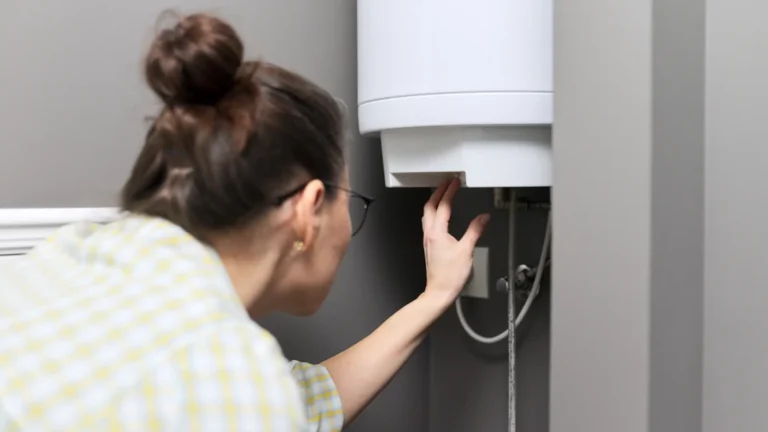So you’re a homeowner in the US and you rely on your water heater every day for showers, dishes, laundry, and more. But how do you know when it’s time for a new one? Recognizing the Signs Your Homes Water Heater Needs Replacement can help you avoid cold showers, expensive emergency repairs, and even water damage. In this guide, we’ll walk through the most common water heater warning signs so you know exactly when to upgrade.
How to Tell If Your Water Heater Is Failing
Water heaters generally have a lifespan of 8-12 years for tank models and up to 20 years for tankless systems. If your unit is approaching or past that water heater age limit, be on the lookout for warning signs.
Here are common water heater failure symptoms to watch for:
- Leaking water heater signs: Water pooling around the base or moisture near the tank means corrosion or cracks inside the tank. Even small leaks can cause big water damage, and this means the tank’s metal lining is rusting.
- Rusty water from faucet: If your hot water is brown or rusty, it’s a sign of corrosion inside the tank or deteriorating sacrificial anodes allowing rust into your water supply.
- Water heater not heating: If your water heater is producing lukewarm or cold water, it could be the thermostat, sediment buildup insulating the heating element,t or failing heating elements.
- Strange noises from water heater: Rumbling, popping or crackling sounds means sediment buildup at the bottom of the tank. This buildup makes the heater work harder and can cause premature failure.
- Inconsistent water temperature: Fluctuating hot water temps or running out of hot water fast means thermostat or heating element issues or sediment interfering with heating efficiency.
- Low hot water pressure: Sediment buildup or corrosion reduces water flow and causes low hot water pressure.
- Pilot light won’t stay lit: For gas water heaters, a pilot light that won’t stay lit means a failing thermocouple or other gas system issues.
- Corrosion on water heater tank: Visible rust spots, peeling paint or wet areas on the tank surface means corrosion has set in and the tank is compromised.
- High energy bills from old water heater: An old water heater with sediment buildup or failing components uses more energy to heat water and increases your utility bills.
- Frequent water heater repairs: If you’re calling a plumber regularly to fix your water heater, it may be more cost-effective to replace it.
Warning Signs That Demand Immediate Attention
Some symptoms require prompt action to avoid damage or safety hazards:
- Leaking water heater: Leaks can worsen quickly, causing water damage and mold growth. If you notice water pooling or dripping, it’s time to call a professional.
- Water heater making rumbling sounds: Loud noises can indicate sediment buildup causing overheating and pressure buildup inside the tank, which can be dangerous.
- Pilot light won’t stay lit: This can lead to gas leaks or inefficient heating and should be addressed immediately.
- Rust-colored water from the faucet: This often means the tank is deteriorating internally and may soon leak.
Ignoring these signs can lead to a sudden water heater failure, flooding, or even safety risks.
When Is It Time to Replace Your Water Heater?
Knowing when to replace your water heater depends on a combination of age, symptoms, and repair history.
- If your water heater is over 10-12 years old and showing any water heater warning signs, replacement is usually the best option.
- Frequent repairs or escalating issues like leaks, corrosion, and poor heating efficiency indicate the unit is failing.
- If sediment buildup and water heater maintenance issues have been neglected, the system may be beyond saving.
- Increased energy bills and an inconsistent hot water supply are signs your old water heater is costing you more than it should.
Upgrading to a new, energy-efficient water heater can save money in the long run and provide reliable hot water.
Common Symptoms You Shouldn’t Ignore
- Hot water is running out quickly during showers or chores.
- The water heater is making rumbling or popping noises.
- Rust-colored or cloudy hot water.
- Leaking around the base or valves.
- Fluctuating water temperature or low hot water pressure.
- Pilot light problems in gas units.
- Visible rust or corrosion on the tank.
- Frequent need for repairs.
Ignoring these can lead to bigger problems, including water damage and costly emergency replacements.
Save Money by Knowing the Right Time to Upgrade
Replacing your water heater before it fails completely can prevent:
- Costly water damage from leaks.
- Higher energy bills due to inefficiency.
- Inconvenience from the sudden loss of hot water.
- Frequent repair costs add up over time.
Modern water heaters are more energy-efficient and reliable, so upgrading can improve your home’s comfort and lower utility bills.
